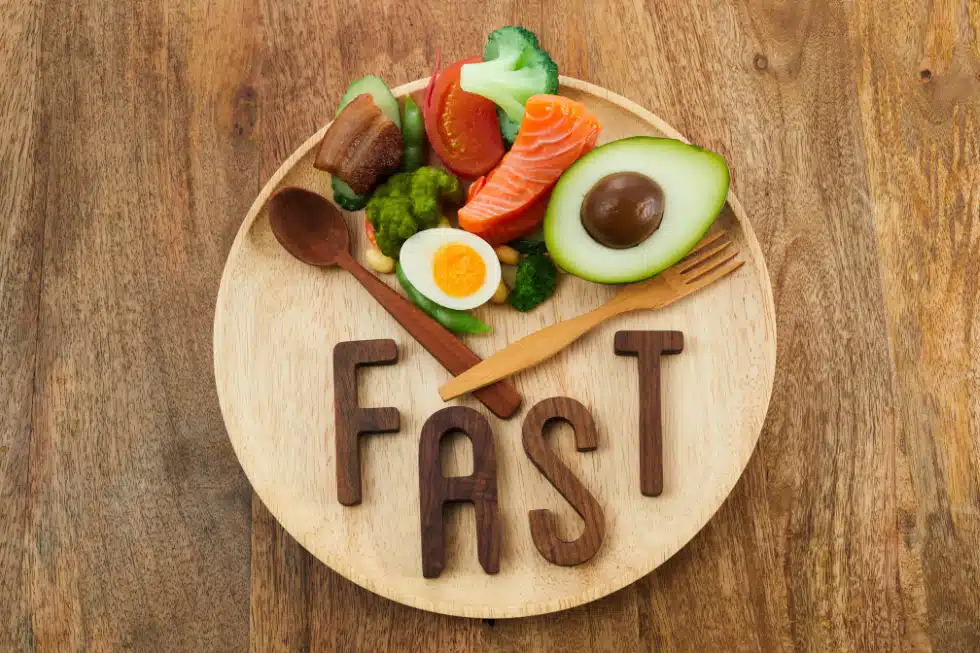Intermittent fasting has emerged as a transformative approach to health and wellness, lauded for its benefits ranging from weight loss to improved metabolic health. This dietary strategy alternates between periods of eating and fasting, challenging traditional norms of frequent meals. However, as simple as it may sound, its effectiveness is deeply influenced by how it’s practiced. Missteps can not only dampen its benefits but also pose risks to one’s health. In this article, “5 Common Mistakes to Avoid for Effective Intermittent Fasting,” we delve into the pitfalls that can derail your fasting journey. From the significance of nutritional balance to the importance of hydration and the impact of consistent schedules, we provide insights to navigate this path with informed precision. Whether you’re a seasoned faster or new to the practice, understanding these common errors can enhance your intermittent fasting experience, ensuring it contributes positively to your health goals. Let’s embark on this educational journey to make your fasting regimen not just a routine, but a cornerstone of a healthy lifestyle.
Mistake 1: Ignoring Nutritional Balance
One of the foundational pillars of effective intermittent fasting is not just when you eat, but what you eat. The allure of unrestricted eating during feeding windows can easily lead to nutritional neglect, a mistake that undermines the vast benefits of intermittent fasting. Nutritional balance is crucial; it ensures that your body receives the essential vitamins, minerals, and other nutrients necessary for optimal functioning.
The Essence of Nutritional Diversity
During your eating window, strive for a plate that mirrors the diversity of a well-tended garden. Half of this plate should be filled with a colorful array of vegetables and fruits, bursting with vitamins, antioxidants, and fiber. These are not just filler foods; they are powerhouse sources of the nutrients your body craves for energy, immune support, and cellular repair.
The Role of Proteins and Fats
Lean proteins and healthy fats should occupy the other half of your plate. Proteins, whether from plant or animal sources, are the building blocks of muscle and a source of essential amino acids. Healthy fats, found in foods like avocados, nuts, and olive oil, support brain health, satiety, and the absorption of fat-soluble vitamins.
Carbohydrates in Moderation
Whole grains and complex carbohydrates are also vital, providing the body with energy and supporting digestive health. Choose sources like quinoa, oats, and sweet potatoes to maintain energy levels without spiking blood sugar.The Pitfall of
Processed Foods
A common pitfall is leaning on processed foods for convenience. These often lack nutritional value and are laden with added sugars and unhealthy fats. Such choices can lead to energy crashes and may contribute to longer-term health issues like heart disease and diabetes.
Integrating Nutritional Balance
Incorporating a variety of foods not only prevents nutritional deficiencies but also enhances the overall effectiveness of intermittent fasting. It can lead to better weight management, improved metabolic health, and a stronger, more resilient body. Remember, intermittent fasting is not a license to eat indiscriminately but an opportunity to focus on nourishing your body with high-quality foods.
In summary, the key to leveraging the full potential of intermittent fasting lies in mindful, balanced eating. By focusing on nutritional quality and variety, you can avoid this common mistake and ensure that your fasting journey is both healthy and sustainable.
Mistake 2: Overeating During Eating Periods
A common trap many fall into while practicing intermittent fasting is overeating during their eating windows. It’s an understandable mistake; after hours of fasting, the temptation to compensate with a large meal can be overwhelming. However, this approach can significantly hinder the benefits of intermittent fasting, leading to weight gain, digestive discomfort, and a disrupted metabolic balance.
Understanding the Temptation to Overeat
The psychology behind overeating during eating periods is rooted in the perception of scarcity. Fasting creates a temporary absence of food, which can heighten the desire to eat more than necessary once food is available. This instinct, while natural, can derail the objectives of intermittent fasting, which include promoting better health and weight management.
The Consequences of Overindulgence
Overloading your plate and consuming a day’s worth of calories in a single sitting can negate the caloric deficit achieved through fasting. Moreover, overeating can strain the digestive system, leading to discomfort, bloating, and other gastrointestinal issues. It also impacts your metabolic health, as the body struggles to process the sudden influx of calories and nutrients efficiently.
Strategies to Prevent Overeating
- Mindful Eating: Pay attention to your body’s hunger cues and stop eating when you’re comfortably full. Eating slowly and without distractions allows you to enjoy your meal and recognize satiety signals.
- Portion Control: Use smaller plates or bowls to naturally limit portion sizes. Planning your meals ahead can also prevent impulsive decisions to overeat.
- Balanced Meals: Ensure your meals are balanced with fiber-rich vegetables, lean proteins, and healthy fats. This combination promotes satiety and helps regulate appetite.
- Hydration: Drinking water before and during meals can help prevent overeating by contributing to a feeling of fullness.
Embracing Moderation
Moderation is key in intermittent fasting. It’s not about extreme restrictions followed by overindulgence, but finding a sustainable balance that supports your health and wellness goals. By being mindful of portion sizes and listening to your body, you can enjoy the benefits of intermittent fasting without the pitfalls of overeating.
Incorporating these strategies into your intermittent fasting regimen can help you maintain a healthy relationship with food and ensure that your eating windows are nourishing, enjoyable, and aligned with your health objectives.
Mistake 3: Neglecting Hydration
Hydration plays a pivotal role in the success of intermittent fasting, yet it’s often overlooked. Water is essential for nearly every function within the body, including digestion, nutrient absorption, and the regulation of body temperature. During fasting periods, maintaining adequate hydration becomes even more critical, as it aids in appetite control, prevents dehydration, and supports metabolic health.
The Importance of Water During Fasting
While fasting, the body continues to require water to perform its basic functions. Drinking sufficient water can also help mitigate feelings of hunger, often mistaken for thirst. Additionally, staying hydrated helps maintain energy levels and concentration, which can be particularly valuable during longer fasting windows.

Strategies for Staying Hydrated
- Set a Daily Water Intake Goal: Aim for at least 8-10 glasses of water per day, adjusting based on your activity level and personal needs.
- Incorporate Hydrating Foods: Consuming foods with high water content, such as cucumbers, zucchinis, watermelons, and strawberries, can contribute to your hydration levels during eating windows.
- Monitor Your Urine Color: Light-colored urine typically indicates proper hydration, whereas darker urine can be a sign of dehydration.
- Use Reminders: Setting reminders to drink water can help ensure you’re consistently hydrating throughout the day, especially if you tend to forget when busy.
Avoiding Caffeinated and Sugary Drinks
While it might be tempting to rely on caffeinated beverages for energy during fasting periods, they can lead to dehydration. Opting for water, herbal teas, or infused water with fruits can be refreshing alternatives that contribute to your hydration goals without the negative effects of caffeine or added sugars.
The Impact of Hydration on Fasting Success
Proper hydration supports the body’s natural detoxification processes and can enhance the health benefits of intermittent fasting, such as improved metabolic rate and increased fat oxidation. It’s a simple yet effective way to amplify the positive outcomes of your fasting regimen.
Understanding the crucial role of hydration in intermittent fasting underscores the need to prioritize water intake throughout the day. By doing so, you can support your body’s health and well-being, making your fasting journey more effective and sustainable.
The Fasting Diet is a structured eating pattern alternating between eating and fasting periods. This approach can promote various health benefits, including weight loss, improved insulin sensitivity, and cellular repair. By restricting calorie intake during specific time windows or days and excluding specific foods, fasting diets help the body tap into stored energy and promote fat loss.
Mistake 4: Inconsistent Fasting Schedules
A key component of a successful intermittent fasting regimen is consistency. Without a regular fasting schedule, individuals may find it challenging to achieve the desired health benefits. Inconsistent fasting can disrupt the body’s internal clock, leading to metabolic confusion, which may impede weight loss and negatively affect overall health.
The Detriments of a Disrupted Routine
The body thrives on predictability. Regular eating and fasting periods help synchronize our internal clocks, optimizing metabolic processes such as glucose regulation, fat burning, and hormonal balance. An erratic fasting schedule can hinder these processes, making it difficult for the body to adapt and perform efficiently.
Challenges of Irregular Fasting
- Metabolic Disruption: Irregular fasting times can confuse the body’s metabolic responses, affecting insulin sensitivity and the efficiency of fat storage and energy use.
- Increased Hunger and Cravings: Without a consistent routine, the body may struggle to regulate hunger hormones, leading to increased appetite and cravings at odd hours.
- Impact on Sleep and Energy Levels: Inconsistent fasting can also affect sleep patterns and energy levels, making it harder to maintain focus and perform daily activities.
Establishing a Consistent Fasting Schedule
- Choose a Feasible Routine: Select a fasting schedule that fits your lifestyle and stick to it. Whether it’s 16/8, 5:2, or another method, consistency is key.
- Plan Ahead: Organize your meals and activities around your fasting schedule to avoid impromptu changes.
- Use Technology: Apps and reminders can help keep you on track, reminding you of your eating and fasting windows.
Adapting to Changes
Life is unpredictable, and occasional deviations from your fasting schedule are inevitable. However, the goal should be to return to your routine as quickly as possible. Flexibility within the framework of consistency helps make intermittent fasting a sustainable practice.
Emphasizing the importance of a consistent fasting schedule is crucial for anyone looking to maximize the benefits of intermittent fasting. By maintaining regular fasting times, you can support your body’s natural rhythms, promoting better health, weight management, and overall well-being.

Mistake 5: Ignoring Personal Health Conditions
When embarking on an intermittent fasting journey, one critical mistake to avoid is overlooking individual health conditions. Each person’s body responds differently to fasting, influenced by factors like metabolism, existing health issues, and medication requirements. Recognizing and respecting these differences is key to ensuring that intermittent fasting is both safe and beneficial.
The Necessity of Personalized Approaches
Intermittent fasting isn’t a one-size-fits-all solution. For some, it can be a highly effective health and weight management tool. However, for individuals with certain health conditions, such as diabetes, eating disorders, or hormonal imbalances, it may pose risks or require careful management.
Consulting Healthcare Professionals
Before starting or adjusting an intermittent fasting regimen, it’s imperative to consult with a healthcare provider. They can offer personalized advice based on your health history, current condition, and goals. This step ensures that your fasting strategy complements your health needs and promotes your overall well-being.
Considerations for Tailoring Your Fasting Plan
- Medical Conditions: Discuss any existing conditions with your doctor to determine if intermittent fasting is advisable.
- Medications: Some medications require food intake for optimal absorption or to prevent side effects. Your healthcare provider can adjust your medication schedule or fasting plan accordingly.
- Nutritional Needs: Specific health conditions may require a tailored approach to nutrition. A dietitian can help design a meal plan that meets your needs during eating windows.
The Role of Ongoing Monitoring
Engaging in intermittent fasting with a health condition requires ongoing monitoring. Regular check-ins with your healthcare provider can help track your progress and make adjustments as needed. This proactive approach ensures that your fasting regimen supports your health without compromising it.
Empowering Your Fasting Journey with Professional Guidance
Incorporating professional advice into your intermittent fasting plan not only enhances its safety but also its effectiveness. By acknowledging and addressing your unique health considerations, you can tailor intermittent fasting to your individual needs, optimizing its benefits for your health and lifestyle.
Conclusion:
Intermittent fasting holds the promise of numerous health benefits, from weight loss to enhanced metabolic health. However, the journey to harnessing these benefits is paved with potential pitfalls. By addressing the common mistakes of ignoring nutritional balance, overeating during eating periods, neglecting hydration, maintaining inconsistent fasting schedules, and overlooking personal health conditions, individuals can significantly enhance the effectiveness of their fasting regimen.
Remember, the essence of intermittent fasting lies not just in the timing of your meals but in the quality of your diet, the consistency of your routine, and the mindfulness towards your body’s signals and needs. Consulting healthcare professionals and tailoring the approach to fit your unique health conditions are crucial steps to ensure your fasting journey is safe, enjoyable, and beneficial.
As we conclude, it’s important to emphasize that intermittent fasting is a tool—one that, when used wisely, can be a powerful ally in your quest for better health. But like any tool, its success lies in how it’s used. Armed with the right knowledge and approach, you can avoid these common mistakes and make intermittent fasting a valuable part of your wellness routine.












